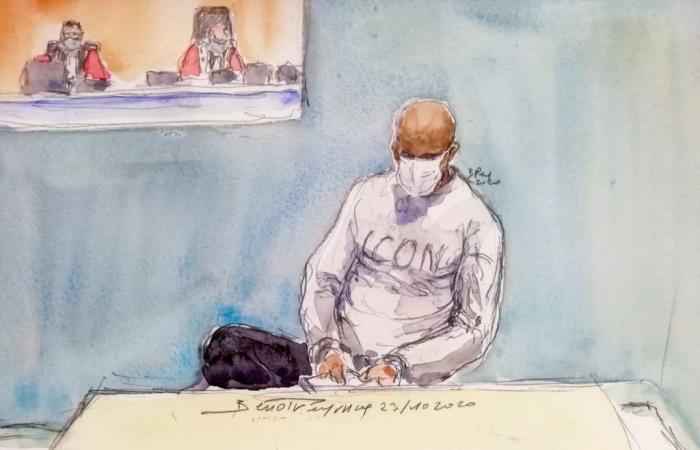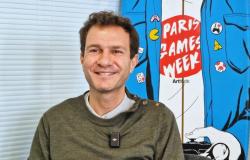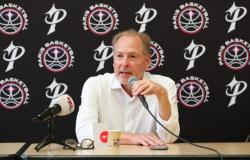– Jihadist Peter Cherif sentenced to life imprisonment
Peter Cherif is convicted for the 2015 attack on the French newspaper and for the kidnapping of humanitarian workers in 2011. A security period of 22 years is added.
Prosecutors requested life imprisonment for Peter Cherif, tried by the Paris Special Assize Court for his involvement in Yemen with Cherif Kouachi, one of the shooters in the 2015 Charlie Hebdo attack .
AFP/Benoit PEYRUCQ
Subscribe now and enjoy the audio playback feature.
BotTalk
The jihadist Peter Cherif, tried in Paris for the role he may have played in Yemen with Chérif Kouachi, one of the attackers of Charlie Hebdo in 2015, and for the kidnapping of three humanitarian workers in 2011, was sentenced Thursday to life imprisonment.
This sentence was accompanied by a security period of 22 years. The president of the Special Assize Court explained that this decision had been taken “in view of the seriousness of the facts” alleged and the “dangerousness” of Peter Cherif.
On Wednesday, at the end of almost three weeks of trial, the two attorneys general requested life imprisonment against him, requesting that this sentence be accompanied by a security period of 22 years.
Peter Cherif’s counsel denounced in their pleadings Thursday morning a “fixed match”.
For Me Nabil El Ouchikli, “the purpose” of the public prosecutor’s office “is to eliminate Peter Cherif, and for this we are obliged to have him convicted in relation to the attacks” of January 2015.
The jihad veteran, aged 42, had been on trial since September 16 for criminal terrorist association between 2011 and 2018, the period of his presence in Yemen within Al-Qaeda in the Arabian Peninsula (Aqpa).
He is accused of having joined the ranks of this jihadist organization and, in this context, of having participated in the training of his childhood friend Chérif Kouachi in the attack committed on January 7, 2015 in Paris on the satirical newspaper Charlie Weekly, where 12 people were murdered. The attack was claimed by AQAP.
He is also appearing for the organized gang kidnapping in 2011, for more than five months, of three French nationals, members of the NGO Triangle Génération Humitaireitaire.
Even though he used his right to silence most of the time during the trial, Peter Cherif admitted to having been one of the jailers of the three humanitarian workers, having served as a “translator” to interface between the hostages and their Yemeni Al-Qaeda kidnappers. On the other hand, he denied having played a role in the Charlie Hebdo attack.
The attorneys general requested that he be declared “guilty” of all the charges against him, painting for more than four hours the portrait of an “integral jihadist” who was “the cornerstone of the preparation” of the attack on Charlie Hebdo, the danger of which, according to them, is still “maximum”.
“Judicial truth”
Concerning the section on Charlie Hebdo, Me El Ouchikli observed that his client was not judged for “complicity”. According to him, “the public prosecutor admitted that he did not have the elements” in this sense “and got around” the difficulty by accusing him of “criminal terrorist association”, a very flexible offense and often qualified of tote.
His colleague, Me Sefen Guez Guez, criticized the elements on which the public prosecutor relied to demonstrate the guilt of Peter Cherif – in particular declassified notes and statements from an arms trafficker. “Is that enough to construct a judicial truth?” he said. “I don’t think so.”
The lawyers tried to respond to the multiple criticisms of the silence observed by Peter Cherif during the debates.
“Has this trial made it possible to answer the questions of the civil parties?” asked Me El Ouchikli. “Perhaps one of the reasons for Peter Cherif’s silence or occasional speaking out is that he doesn’t have these answers,” he said.
“What he is ready to assume is a totally disembodied story”, but when asked factual questions, “he closes” and “as soon as we talk about the 2015 attacks, he flees”, criticized one of the two attorneys general, Benjamin Chambre.
“There was incomprehension and anger,” declared Me Marie-Laure Barré during the pleadings of the civil party lawyers.
“Answering questions, those were acts of compassion. We had nothing, everything was under control,” she continued. “This strategy is disastrous, it hurts.”
Just before the court left to deliberate, Peter Cherif, who was invited to speak, indicated that he had “nothing to add”.
“Latest news”
Want to stay on top of the news? “Tribune de Genève” offers you two meetings per day, directly in your email box. So you don’t miss anything that’s happening in your canton, in Switzerland or around the world.
Other newsletters
Log in
AFP
Did you find an error? Please report it to us.
0 comments






